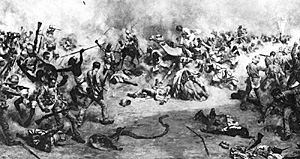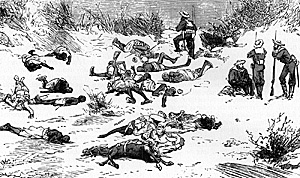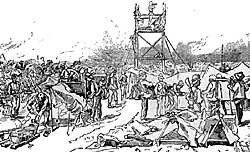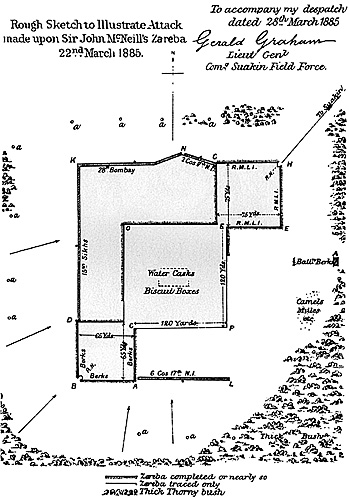For a description of the battle we have a eyewitness account from Major E. A. De Cosson who was an officer in command of water supplies for the column. He wrote the book 'Days and Nights of Service with Sir Gerald Graham's Field Force at Suakim' from which the following account is taken.
Troop positions at 2.30pm prior to attack, as described by General Graham. "Half the Berkshire Regiment were S. of the zeriba ABCD, cutting brushwood; their arms were piled inside. The line AL was held by six companies 17th N.I., their left being somewhat en Vair; the line DK by the 15th Sikhs; KN by the 28th Bombay N.I.; NG by two companies of the 17th N.I.;- Outposts aa.. consisting of groups of four men each, were thrown out from 80 to 120 yards to the front of the three Indian Regiments. These three Regiments themselves were formed in two deep line.
The other half Battalion of the Berkshire Regiments themselves were formed in two deep line. The other half Battalion of the Berkshire Regiment were having their dinners at about the point R, 250 yards to the E. of the zeriba.
The Marines were inside the North zeriba EFGH, having just finished cutting brushwood. The camels had been unloaded in the central zeriba and had bepn to file out, in order to be formed up outside, ready for the return march. The squadron 5th Lancers formed a chain of Cossack posts (each four men), at a distance of about 1000 yards from the force, the rest of the squadron being held in support on some open ground about 500 yards to the S.W. of the zeriba. A squadron of the 20th Hussars was patrolling the ground between the zeriba and Suakim.
"It is eight minutes to three o'clock; the water camels have been formed into a close column and are just beginning to move; I have turned my horse's head towards the central zeriba, intending to ride back and report to the General that everything is ready, when a strange, shrill, startled cry rises from the rear of the camels behind me, and I see some twenty or thirty of the native drivers running towards me as fast as they can.
"I had not heard a single shot fired, and so little was I aware of any imminent danger, that I supposed the Somali and Indian drivers were fighting amongst themselves ' as they did, and that these fellows were running to me to have their dispute settled; I therefore turned round, and for the first time, the truth flashed across me, for a glance showed the dark forms and gleaming swords, and spears of the Hadendowas behind, hacking and stabbing right and left as they charged. They appeared to be coming through the rear ranks of the camels from the direction of the seacoast, but the head of the convoy was undisturbed, and almost simultaneously a great shout rose from the S.W. side of the zeriba, and a few shots were fired.
I frankly confess my first impulse was to ride straight into the zeriba behind me, where I could see the troops already hastening to snatch up their arms; but remembering that the officers at the head of the convoy, which was very long one, might not be aware of what was happening in rear, and that, as the camels were some distance from the zeriba, they and their unfortunate drivers, who were quite unarmed, might be cut off, I determined to try and warn them before it was too late, and galloped back to the head of the convoy, stopping for a moment beside each section, and calling to the non-commissioned officers in charge to get the drivers at once into the zeriba, for alas! I could not speak Hindustanee myself.
 1st Batt. Berkshire Regt. hard pressed during the Battle.
1st Batt. Berkshire Regt. hard pressed during the Battle.
Shrill Cry "The shrill cry which had first attracted my attention soon changed into a frantic yell, the horse roar of 5000 tongues, and the black swarm of Arabs seemed rising up like the sands of the desert all round us; indeed, so numerous were they, that the very stones might have been transformed by the stroke of a magician's wand into swarthy warriors armed with spear and sword. To reach the head of the convoy I had to ride away from the zeriba, and I had hardly given my last caution, before the huge concourse of animals shivered, swayed, and then burst into motion; pouting down upon me with irresistible force, like the waters of some mighty dam when it bursts its banks.
Those who were watching the plain from Suakim, said that at this moment a gigantic column of dust suddenly rose into the air, which they took for a charge of Cavalry, then the whole of our little force appeared to burst asunder, amid smoke and fire, like an exploding shell; and the plain was instantly covered with riderless horses, camels and mules tearing towards Suakim in mad terror.
"It was through this chaotic mass of terrified animals that I had now to force my may to regain the zeriba. I saw the familiar faces of friends pass by me like the vision of the damned in Dante's Infierno, and even exchanged a word or two with some; but the next moment they were swept away and far out of reach, divided by the roaring, plunging rush of camels, riderless horses, carts without drivers, pack mules chained three together, with loss ammunition boxes clattering behind them, all bolting in mad panic towards the Suakim. The Arabs were running among them, cutting and stabbing, nimble as cats but my chief anxiety was to save my legs firom being broken, or my horse thrown down by the sheer weight of rushing beasts.
It was fortunate for me that my heels were armed with sharp jack-spurs, and that I was riding a powerful English mare, steady and courageous, which obeyed my guiding hand with unquestioning faith.
By a vigorous use of knee, spur, and bridle, I at last succeeded in shaking myself free of the stampede, and saw the dark and welcome fence of the Marine zeriba, beyond which I had been swept, rising before me. I think everybody else on that side had got in, and the Arabs were close behind. I could see the men's rifles levelled over the hedge, and the thought struck me, if they fire a volley now, I shall never get over; but they waited till, with one last dig of the spur, I had leaped in, and then the whole face of the zeriba burst into a crackling line of fire, and for a moment the heavy smoke hid everything outside from view.
Steady, Men
"Steady, men, fill up the intervals, fire low", I was calling to those nearest me, when a yell behind, warned us that we were menaced in another direction.
"For some reason the Marines, with a few of the Transport corps and Indians, were all collected along the two lower sides of the zeriba, near the Gardner guns, and the upper, or East side of the enclosure was undefended. According to one account, the Marines had been swept away from this side of the zeriba by the stampede of the Transport animals, apart of which had crossed it; but I think it more probably that the arms were piled near the Gardner guns, and that the men who were digging the trench, accordingly, first rallied on the sides nearest to them.
However this may be, the Eastern side of the zeriba was not lined with men, and a portion of the Arabs who had attacked the camels, now dashed over the hedge with great intrepidity into the very middle of the square. The Marines in the front rank still continued firing outwards with much steadiness at the enemy, now swarming all round, but the rear rank faced about, and I saw some of the men kneel down to shoot under our horses' bellies, for most of the mounted officers were between them and the Arabs who had entered the zeriba.
It was a trying moment, for the men found themselves attacked both front and rear, and by the way they clustered back to back, and the strained expression of their faces, it was easy to see that they felt their position to be critical. Indeed, any flinching might have led to a panic. "Steady men, stand steady", rang out the quiet, reassuring voices of the officers, who, drawing their revolvers, fired down on the advancing Arabs, while the men aimed under their horses, or between them, as best they could.
For a moment the centre of the zeriba was full of smoke, but when it lifted not an Arab was left standing, the foremost having reached within about six yards of the rear side of the square, and the rest turned and fled, leaving six of their dead in the centre of the little enclosure. The East side was now immediately lined, and the firing all round became fast and furious.
"The firing still continues fast and furious from sides of the zeriba, and our great anxiety is to prevent our men from shooting any of their comrades, some of who have formed small rallying squares where they were surprised, and are now making their way back into the zeriba. But I cannot any longer see what is going on beyond, for just after the centre of the square had been cleared, a shower of bullets from among the mimosa trees outside flew past me, and my mare reared bolt upright, shot through the head, and then rolled over, with her off foreleg also broken by another bullet which struck her as she pawed the air; so I have come down, as my orderly with my second horse has bolted in the stampede, I have to be content to fight the rest of battle on foot.
Cease Fire
After about the twenty minutes, the bugles sound the 'cease fire' and cheer on cheer rises from the men as they see the ground clear before them, though strewn with may a dusky form and whole sheaves of camels which have fallen before our own fire. A great deal of independent firing still goes on, as some of the enemy are seen moving among the bushes, and there are one or two false alarms which produce volleys; but the fighting is now over, and parties begin to go out to collect the wounded.
"Thus I wrote shortly after the fight, which is my only excuse for dwelling so long on mere personal impressions. I must now turn to what I afterwards learned had happened in other parts of the zeriba.
Main Rush
"The main rush apparently came from the direction of Tamai, and was poured straight on the salient angle of the Berkshire zeriba; but there is little room for doubt that the Arab army advanced in the usual formation adopted by nearly all savage tribes in Africa, which will be familiar to officers who have fought against the Zulus, viz. a half- moon, the horns of which are intended to close round in rear of the force menaced, until it is completely encircled.; This, in my opinion, was proved by the fact that I found the enemy running through the convoy of camels on the left, before I heard any firing in front; and is confirmed by the reports of the Times and Telegraph correspond- ents, who both happened to be near that side, and the first of whom says: "Suddenly, and without more than hurried warning, the enemy burst from the thick bush and dashed headlong, without firing a shot, at the water transport", and the second, --- "Suddenly, from in front of me, there went up a sharp, amazed, and painful cry. I looked up. The whole mass of camels was swaying to and fro".
If we couple this with the evidence that a large portion of the convoy was driven inwards towards the zeriba, and, indeed, across it, I think there can be little doubt that the Arabs designed their attack to strike our front and flanks very nearly at the same time. I could not, of course, see what happened on the other side of the zeriba, but, from the sound of their fire, the 15th Sikhs apparently found themselves quickly engaged and very soon swarms of the enemy closed all round, completing the circle. There is, however, no doubt that the greatest weight of the charge fell direct on the angle of the Berk- shire zeriba, where, unfortunately, the Gardner guns in the redoubt were not yet ready to be brought into action, while many of the Berkshire men forming its garrison were outside in the bush cutting trees.
I am told that the Brigade Major saw the Arabs rushing through the I 7th Native Infantry on the transport, and this is no doubt correct, for, when they had driven that regiment back, they poured on the rear of the transport and completed its demoralization.
"I should have hesitated to refer to the unsteadiness of the 17th Native Infantry. The letter of a distinguished officer now before me says:--- "The 17th bolted before the enemy reached them;" and adds, "Hudson reports, had the 17th stood, hardly a camel would have been lost". That may perhaps be a somewhat sanguine view to take, but there is not the slightest doubt that if the 17th had remained firm on the ground where they were originally placed, and fired volleys steadily into the advancing Arabs, it would have materially altered the results of the day.
"Instead of doing this, they appear, when the Cavalry vedettes came galloping in upon them, closely followed by the enemy, to have discharge one wild volley and then broken and streamed, or at least part of them, into the Berkshire zeriba, where General McNeill in person gallantly attempted to rally them, though without success, for they could not be prevailed on to stand, and after firing another volley, retreated as the Arabs advanced into the central zeriba, where a portion of them were at last rallied and induced to line the fence, the remainder breaking and following the stampede towards Suakim, only to be ruthlessly cut down by the enemy when overtaken.
 A corner of the R.M.L.I. square 15 minutes after the attack.
A corner of the R.M.L.I. square 15 minutes after the attack.
I myself saw those in the central zeriba firing in a very wild fashion, some of their bullets coming into the Marines' square where I was standing, and others apparently being fired into the air. Some allowance must be made for the excitement produced by such a sudden attack; and it is quite possible that the vedettes first galloping through them, disorganized their ranks. It is also possible that, as their left flank was what General Graham calls "somewhat en l'air", they may have imagined that their rear was turned, if on looking over their shoulders they saw the Arabs attacking the flank of the transport animals. Their Gallant commander, Major Beverhoudt, lost his life while unsuccessfully striving to rally his men, though both the Native and European officers did all their power to check the panic".
Notable Praise
The 15th Sikhs and the 28th Bombay N.I., who stood their ground most gallantly, pouring volley after volley into the enemy without any sign of unsteadiness. The action of one Native officer commanding the flank company of Sikhs, was specially worthy of praise, for he saved the lives of two of the Berkshire men, who had been employed outside on the left of his company, by flinging himself between them and the pursuing Arabs, three of whom he cut down with is sword. The Madras Sappers were also perfectly steady wherever engaged.
The men of the Naval Brigade, in the redoubt towards Tamai, suffered severely, for, on the retreat of the 17th from the Berkshire zeriba, they were left nearly alone with their useless Gardners to bear the full brunt of the Arab charge; but they would not desert their guns, and poor Seymour and five of his men were slain, while bravely defending them from the enemy, who actually planted a white standard worked with red letters on the redoubt.
After this, no less than 112 of the enemy poured into the zeriba, but not one of them left it alive, for the Berkshire men who had been out cutting bush, now dashed boldly into the enclosure after the Arabs, in many cases with empty hands, and snatching up their rifles from the pile, engaged the enemy hand to hand with the bayonet.
Before long 112 dead Hadendowas were lying in this small enclosure 65 yards square, and the Berkshire men had triumphantly relined it side and commenced sweeping the surrounding country with their fire. This, to my mind, was the most notable achievement of a day which was conspicuous for the many acts of personal gallantry there were performed.
"The other half Battalion of the Berkshire Regiment, which, as I have before said, was being served with food and water on the open ground about 250 yards east of the zeriba, at the first alarm formed a rallying square round its officers, and, notwithstanding that a large portion of the stampeded transport rushed down on it, remained so firm and poured such as steady fire on the Arabs, who repeatedly charged it, that it did not lose a single men; though over 200 of the enemy were afterwards found dead round the spot where the square had stood. One man alone was wounded by a spear, which a dying Arab managed to hurl at him with desperate tenacity where he fell.
 Inside the Zeriba - five days after the battle.
Inside the Zeriba - five days after the battle.
This was another proof, if any were needed, that even a small body of men are practically safe against the fiercest Arab charge when armed with breechloaders, so long as they have ammunition and fire steadily. When the first heat of the onslaught was over, this little square retired slowly on the Marines' zeriba, the men sticking their helmets on their bayonets to prevent the troops inside from mistaking them for the enemy, as they approached through the dense clouds of smoke which hung heavily all round.
I was in the zeriba at the time, and there was some little difficulty in restraining the men's fire; but somebody, whether intentionally or in error I do not know, called out, "it is reinforcements coming" this was repeated from mouth to mouth and had an immediate effect, for the men stopped firing and began to cheer. I left off the extract from my journal when my horse was killed, which happened a few minutes after I had gained the zeriba, and when the Arabs who entered it were either all slain or put to fight. I will now try to describe the scene inside the enclosure.
Inside the Enclosure
"There was still plenty to do, for the men were firing much too fast, and their tendency to cluster together had to be corrected and the intervals filled up. Details from various regiments, who had run hastily in, were all mixed together; and officers like myself, who had no men of their own, busied them selves attempting to discipline the fire of those who seemed most to need it, and warning them not shoot whenever a straggling party of their comrades made its way up to the zeriba, for many little knots of men working in the bush had found themselves cut off during the first rush of the enemy, and had to stand back to back defending themselves at best the could, till an opportunity occurred for them to regain their companions.
It was essentially a soldier's battle, for there was naturally no manoeuvring, and the men had simply to stand and fight where they were, while all the Officers could do was to encourage them. I found time to light a pipe during the scrimmage, not because I particularly wanted it, but because it was good a thing to do as anything else, for inside a British square one cannot be always waving a sword like the officers in the Illustrated Papers, and perhaps - for so small are the motives that influence our actions - because I had somewhere read in the Soldier's Pocket- book, of a Staff officer who sat cheerily smiling and puffing a cigar while round shot were rolling like polo balls between his horse's legs, and a shrapnel shell carried of his wig and eyebrows as it passed. This is perhaps not quite a correct version of the story, but it is somewhat like it.
"Under the shelter of the telegraph wagon, the doctors were already busy succouring the wounded, while the telegraph people sat calmly wiring to Headquarters the intelligence, which by this time must have been clearly apparent, that we were now engaged with the enemy. I saw the Times correspondent, who then was a stranger to me, rapidly scribbling his notes, as he stood with the bridle of his horse over one arm, and the artist of the Graphic, also making thumbnail sketches of the different corners of the zeriba on his block, while the turmoil was raging all round.
Outside, the heavy rolling smoke made the moving figures look dim and fantastic, like shadows seen through a thick fog, but, whenever the smoke lifted for a moment, we could descry large masses of the enemy hovering and circling round, searching for a weak place to rush in at; while every now and then small groups of Arabs, sometimes only a single man, would run out from the rest at sort of jog-trot, and boldly approach the levelled line of rifles, brandishing sword or spear in the air with an exaggerated action of defiance, which would have been absurd, had it not been pathetic, and apparently quite content to make one cut or thrust at an unbeliever before falling riddled with bullets. These were the fanatics, the backbone of Osman Dignas army".
Casualties
British
117 officers and men killed, and 179 wounded. Up to 700 pack animals killed
Mahdist
Approx. 1,500 killed.
General Graham's Map of the Camp

Note regarding above map
The above plan was drawn by General Graham shortly after the battle for his dispatch on the 28th of March. The following points correct some inaccuracies. The scrub was far closer on the North and West sides. The 17th Native Infantry were angled back facing South, South East from point A. The camels and mules occupied a far larger area than that indicated. The Mahdist attack (indicated by arrows) took place on the East side as well, this is not shown on the map.
More McNeill
-
McNeill's Zeriba: Introduction
McNeill's Zeriba: The Battle
McNeill's Zeriba: Battle Profile (Analysis) and Wargaming
Back to Colonial Conquest Issue 4 Table of Contents
Back to Colonial Conquest List of Issues
Back to MagWeb Master List of Magazines
© Copyright 1993 by Partizan Press.
This article appears in MagWeb (Magazine Web) on the Internet World Wide Web.
Other military history articles and gaming articles are available at http://www.magweb.com